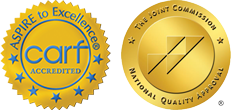Detoxification or detox is the process of withdrawing a person who is addicted to drugs or alcohol from the substance of abuse. It is a critical first step in addiction treatment.
When a person uses drugs or alcohol for a prolonged period, they can experience a wide range of physical and psychological symptoms when they try to reduce or stop substance abuse. These symptoms are known as withdrawal symptoms. The appearance of unpleasant withdrawal symptoms and severe cravings are the main reasons many people are unable to quit using drugs and alcohol. Affordable detox rehab makes it possible for recovering addicts to stop substance abuse safely and comfortably.
During inpatient detox, clients receive round-the-clock medical supervision. Withdrawal symptoms are managed with medications and other treatment options.
What is Inpatient Detox?
Inpatient detoxification is a program during which a recovering addict stays at a residential rehab facility to undergo withdrawal from illicit drugs or alcohol. During this time at a drug detox center, clients receive round-the-clock medical supervision and support as they go through the physiologic adjustment when drugs and alcohol are removed from the body.
It is important to understand that Washington detox treatment facilities are not a standalone treatment for substance use disorders. Rather, they are the first step in a comprehensive approach to addiction treatment. The goal of inpatient detox is to manage withdrawal symptoms, ensure the client’s safety and comfort, and ultimately, stop drug use.
What Happens at a Drug Detox Center?
Addiction treatment typically starts with a detox program, which is customized to each patient’s unique needs. In most cases, three steps are performed during detoxification:
Healthcare providers at drug rehab centers evaluate the client and obtain a thorough medical and drug use history. They perform a physical exam and order lab investigations. This is essential for treatment planning.
The next step in a Washington detox program is the withdrawal phase. The clinical team uses a variety of medications to stabilize the patient, ease withdrawal symptoms, and reduce cravings during this phase of detox.
The third step in affordable drug rehab is providing clients with the psychological support they need to prepare for lasting recovery.
Inpatient rehab is essential to ensure safe withdrawal from drugs and alcohol. At Discover Recovery, we provide 24×7 supervision for people undergoing detoxification. This is important to identify and treat any medical complications that arise during detox. Without this intensive medical management, clients are at risk of dangerous, even life-threatening complications. The staff at Discover Recovery Treatment Center are supportive, non-judgmental, and culturally sensitive. Their considerable experience in drug detox goes a long way in giving clients the best chance of sustainable recovery.
Can I Detox At Home?
Opting to detox at home can pose challenges or even result in severe consequences such as death. Going cold turkey, especially in the absence of medical supervision, may lead to seizures or severe dehydration (in the case of alcohol). This happens due to the individual’s long-term physical and psychological dependence on the substance being used. Because the mind and the body become habituated to the substance, quitting its use abruptly can lead to withdrawal symptoms that may be mildly irritating or even life-threatening. These withdrawal symptoms include:
- Anxiety
- Hallucinations
- Depression
- Seizures/tremors
- Delirium tremens
To combat addiction the right way, the most effective approach needs to be chosen—which is where medical professionals who have gov certifications and skills in treating addictions come into play. While there are accredited inpatient and outpatient rehab programs available to manage the above mentioned symptoms, those with severe addictions are advised to go for inpatient treatment so that they can get round-the-clock supervision from medical professionals and safer and more effective recovery services, as opposed to outpatient services.
The Process Of Detoxification
The detox process can vary from person to person as requirements for each individual may be different. Drug detoxification is a tailored process that is aimed at providing people with a substance use disorder with personalized treatment. A typical detoxification process covers three steps:
- Evaluation
At the arrival of the patient, the medical team at a rehab center carries out assessments for both physical and mental health disorders. Doctors may run blood tests to check drug levels in the patient’s system so that they can ascertain what medications will be required and in what doses. A thoroughly done assessment can tell doctors about the patient’s drug use habits, medical history, and psychiatric condition. These findings help the medical team design and provide the best treatment plan for the patient. - Stabilization
Next, the patient is stabilized by employing the medical and psychological therapies. This is the stage where medical supervisors must pay careful attention to the patient to safeguard them from any harm. Doctors will prescribe medications to prevent complications and reduce the occurrence of withdrawal symptoms. This ensures a smooth recovery process for the patient. - Preparing Entry Into Treatment
The last and most crucial step of the detoxification process starts with the preparation for the treatment program. The doctor will spend some time getting the patient ready for the treatment by explaining to them what the treatment will consist of, how long it will take, and what outcomes can be expected. While outpatient treatment programs with 12-step programs may be suitable for individuals with mild addictions, inpatient rehabilitation is best suited for those suffering from severe addictions. Inpatient programs are also the most effective for post-detox success, as they offer the most favorable outcomes in the long run.
Side Effects of Detox
Detox can be painful and dangerous, which is why medical detox is essential. When detox is done under the care of medical professionals, the process can be completed in a safe and comfortable environment. The level of care and supervision can vary for an inpatient program and an intensive outpatient program.
Medical detox helps prevent the occurrence of potentially dangerous drug and alcohol withdrawal effects. While medically supervised detox limits the number of withdrawal symptoms, some cannot be avoided. According to the National Institute on Drug Abuse, some common side effects include:
- Anxiety
- Lack of sleep
- Nausea
- Physical discomfort
- Mood swings
- Sleep disturbances
- Difficulty concentrating
Drug Detox During Pregnancy
Alcohol and drug use during pregnancy can pose serious risks to the mother and the fetus. These substances can cross the placenta and result in complications for the baby, so avoiding these substances becomes necessary for pregnant women. Unsupervised detox, especially when quitting substance use suddenly, can cause the fetus stress and even lead to preterm labor.
Do you have a loved one struggling with addiction?
We know how hard that can be. Give us a call to find out what options you have.
Due to this, residential treatment is recommended to reduce the occurrence of withdrawal symptoms and prevent harm to the fetus. The main goals of medication-assisted treatment for pregnant women may involve relapse prevention and managing discomfort during the process that family members may not be equipped to handle. Detox specialists can take care of both. Doctors use prescription drugs to stabilize pregnant women to avoid any complications. Opiate and alcohol detox can do the most harm to the fetus; if not done under medical supervision, the chances of stillbirth can double or even triple, depending on the type of drug being used. Other effects include fetal alcohol syndrome, birth abnormalities, low birth weight, premature birth, and neurological effects.
Therefore, it is necessary that pregnant women do not detox on their own and instead seek professional help for medical detox. Although some prescribed medications come with a disclaimer and may even help eliminate detox symptoms, their dosage and side effects must be monitored by doctors. With medically assisted detox, pregnant women get round-the-clock support, which is the optimal approach to detoxifying and ensuring the overall health of the mother and the fetus remains unaffected.
Detox Diets
An essential part of substance abuse treatment is taking a balanced diet. Proper nutrition aids in the body’s recovery from drug abuse, especially during alcohol rehab. A nourishing diet provides the body with energy and speeds up the healing process. This is precisely why drug addiction treatment programs at many detox centers offer dietary plans tailored to individual requirements. These diets can also be continued after the treatments are over.
Addiction can significantly disrupt the dietary habits of individuals, causing some to gain weight and others to lose some. The lack of a nutritious diet can lead to nutritional deficiencies and malnourishment. Therefore, a diet rich in fruits and vegetables can be beneficial for the recovery process. All processed foods must, however, be eliminated, and water intake must be maintained to avoid dehydration, particularly in cases of alcohol addiction.
Benefits of Certain Diets
At addiction treatment centers, detox specialists often incorporate specific foods into the diet of individuals undergoing drug abuse treatment to optimize the recovery process and ensure overall well-being. By following the dietary guidelines below, a treatment provider can maximize the effectiveness of group therapy, counseling, recovery support groups, and other treatment services:
- Stay Hydrated: Hydration accelerates the detoxification process, hence aim to drink lots of water throughout the day.
- Have Balanced Meals: Meals that include all nutrients in equal amounts, including carbohydrates, proteins, and healthy fats, help stabilize blood sugar levels and provide sustained energy for the detox process.
- Have More Fruits and Vegetables: Add a range of fruits and vegetables rich in vitamins, minerals, and antioxidants to your diet. These boost immune function and speed up healing.
- Include Whole Grains: Whole grains like brown rice, quinoa, whole wheat bread, and oats provide fiber and nutrients that help with digestion and maintain energy levels in the body.
- Consume Lean Proteins: Eat poultry, fish, beans, lentils, tofu, and nuts, which are all sources of lean proteins. Proteins aid in tissue repair and muscle mass maintenance.
- Have Healthy Fats: Eat avocados, nuts, seeds, olive oil, and fatty fish like salmon and mackerel to consume healthy fats, which are good for brain health and reducing inflammation.
- Include Probiotic Foods: Add probiotic-rich foods like yogurt, kefir, sauerkraut, and kimchi to your diet to improve gut health and mood.
- Eliminate Sugary and Processed Foods: Avoid consuming sugary and processed foods, as they result in energy loss and mood swings.
- Practice Mindful Eating: Pay attention to what you eat. This can ensure healthy eating.
- Cut Back on Caffeine: Although caffeine in small amounts is acceptable, excessive use can disturb sleep and cause anxiety.
How Long Does Detox Take?
The duration of addiction treatment, specifically detox, depends on several factors, including the type of drug used, the severity of the addiction, and the method of use (injecting, smoking, snorting, swallowing). Moreover, each client is unique. How long it takes someone to come off drugs or alcohol depends on their genetic makeup, coexisting health conditions, mental illnesses, and psychosocial background.
Detox programs at Discover Recovery typically last a week. Withdrawal symptoms and detox programs for various drugs usually last for:1
- Alcohol: 2-10 days
- Opioids (prescription pain pills and heroin): 4-10 days
- Benzodiazepines (Xanax and Valium): 2-6 weeks
- Stimulants (cocaine): 3-5 days
Are There Any Affordable Detox Rehab Programs?
Quitting drugs and alcohol without any supervision or monitoring can be dangerous. Complications during withdrawal can be life-threatening, even fatal. For instance, a severe form of alcohol withdrawal known as delirium tremens can lead to coma and death.
If cost is a factor and you are looking for affordable detox rehab programs, you could consider a social detox. This typically consists of room and board and non-medical supervision and support while you quit using drugs or alcohol. If any medical care is required during your social detox, you will have to obtain it through your local urgent care center or emergency department.
Social detox occasionally works for some people, but it is not as effective as detox and addiction treatment at a professional facility. However, for some individuals who have no health insurance, such as Medicaid or Medicare, or very limited resources, it is the only viable option for affordable detox rehab and is better than no treatment at all.
Benefits of Treatment at a Detox Facility
During detoxification at Discover Recovery, a top-rated drug detox center in Washington, a highly experienced and compassionate clinical team provides round-the-clock support and medical care. Healthcare providers prescribe a range of medications to ease your withdrawal symptoms and reduce drug cravings.
For instance, clients, particularly adolescents and young adults experiencing alcohol withdrawal, often suffer from agitation, delirium, and seizures. During a Washington detox medically supervised program, such clients can be prescribed benzodiazepines to manage these symptoms.
Moreover, various withdrawal symptoms like insomnia, nausea, restlessness, muscle aches, and anxiety can be treated with prescription medications during medical detox. As a result, withdrawal and detox are safe and comfortable. What’s more, clients do not have continued access to drugs or alcohol during inpatient detox. This reduces the chances of relapse and increases the chances of long-term recovery.
Getting Addiction Treatment in Washington
If you or someone you love needs evidence-based treatment at a drug detox center in Washington, get in touch with us on our hotline today. You may also contact authorities on SAMHSA’s free national helpline.. Our medical detox program will minimize the discomfort of withdrawal and prepare you or your loved one for the next phase of recovery. During detox, our nurse practitioners and registered nurses will monitor you 24×7. You will receive the support and care necessary to make a strong start to recovery. Our clinical team will prescribe medications to ease withdrawal symptoms and reduce cravings. Once you have completed detoxification, you can proceed to the next step of rehab, which includes counseling, behavioral health therapies, group support, and numerous holistic treatment approaches to assist with aftercare. Many of our clients at Discover Recovery complete inpatient detox and move forward to our residential rehab program with an intensive curriculum of 30 days or more to get back to sober living again.





